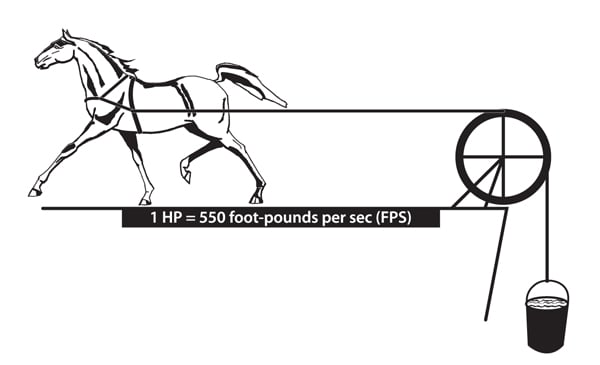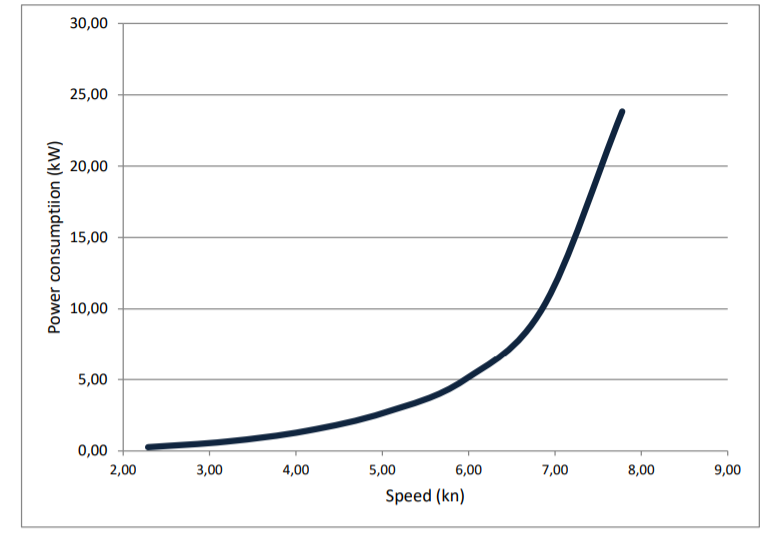We often get asked, “How does the horsepower of a gas or diesel engine compare to the kW rating of an electric motor?”
The simple answer, which is directionally correct, but not precise is that an electric motor of X kW is comparable to a gas or diesel engine with HP 1.3-3 times higher. That’s a wide range because the two don’t directly compare.
Now, here’s the real answer. And it comes with a warning label, the following explanation is made overly complex by the inclusion of history, math and the difference between optimal and real-world outputs.
First, we have to look at where horsepower came from. James Watt, who perfected the steam engine for trains, needed a way to explain how much work a steam engine could do.

He calculated that a horse could move 33,000 pounds one foot in one minute or 550 pounds per second. The big challenge with horses (and engines) is that they can’t do this work forever – store this nugget, we’ll come back to it.
Engines are actually producing torque or the rotational equivalent of a linear force. Remember, horsepower is just a marketing analogy thought up by Mr. Watt, so one has to convert torque to horsepower to measure an engine’s HP. The formula for converting torque to horsepower is: Torque = (Horsepower x 5,252) ÷ RPM. Therefore, horsepower is measuring the amount of torque that can be created to turn the propeller at a certain RPM and cause the boat to move forward.
So, what we really need to be thinking about is torque and this brings us to why electric motors are better than gas engines.
Gas and diesel engines have a torque curve with a prominent peak as you can only achieve that output at a specific level of RPMs that the engine was rated at by the manufacturer. Additionally, engine specific factors such as how recently your oil was changed, whether your engine room is well ventilated, what type of fuel filter you are using and environmental conditions such as humidity, air pressure and temperature also affect the torque output of a gas or diesel engine. Because of this, you almost never get the rated horsepower capacity of an engine out of it (just like a horse can’t achieve its power potential on a scorching hot day compared to a nice cool morning). This inability for gas and diesel engines to achieve their rated horsepower is what makes comparing HP to kW difficult. Electric motors have a more constant output across a range of conditions and thus you have the potential power of the motor available to you all the time.
As a boater, what you really need to know is that whatever electric motor or gas engine you have is sized correctly for your boat.
To do this, you will want to use the boat’s displacement, length of the waterline, keel size and shape, rudder size and shape and a few other factors to estimate the power consumption measured in kilowatts to achieve speed. This is the power consumption curve for the Salona S44 done by Oceanvolt. The goal is to get a motor that is big enough for you to achieve hull speed, but not try to push the boat past it. As you can see from the below graph, this takes enormous amounts of energy that would drain your battery quickly for only a marginal gain in speed. Based on this power consumption curve, Oceanvolt recommended a 15kW motor for the Salona S44. You can see that a 10kW motor would probably work, but might be a tad undersized and a 20kW motor would be overkill.

Thus, at the end of the day, it is more important to think about sizing your electric motor correctly and not comparing kilowatts to horsepower. If you ask us at Green Yachts this question, we will be happy to help you figure out your power needs for an electric motor on any boat. We enjoy helping boaters figure this out a lot more than feeling awkward giving the above overly simple or overly complex answers when asked to compare engine horsepower to electric motor kilowatts!



Leave Comment